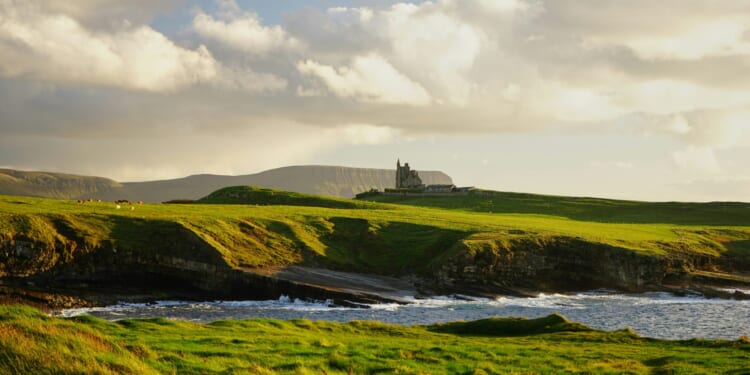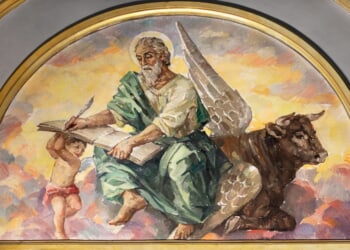It seems every American I meet claims to be Irish. Not just in ancestry, but in spirit. Some insist their great-great-grandmother left Cork with nothing but a shawl and a dream; others claim a McSomething surname buried somewhere in the family tree as proof of kinship. The truth often dissolves under scrutiny, but that hardly matters. To be Irish, at least in the American imagination, is no longer about blood — it’s about belonging to a romantic idea.
The Irish have become a cultural accessory, a kind of spiritual tattoo. There’s the misty nostalgia of peat fires, the sing-song accent, the tragic humor. Americans love the Irish story. The poor but poetic immigrants who climbed their way up from the docks to the White House, armed with little more than faith and blarney. They love it because it flatters them. It allows them to claim endurance without ever knowing hunger, defiance without ever facing empire. When they wear green on St. Patrick’s Day or sing “Danny Boy,” it’s less devotion to heritage than performance, less remembrance than roudy routine. (RELATED: America’s Dumbest Refugees Pick God’s Cruelest Joke)
For most Americans, the island is less a place than a mood: a hazy dream of courage, sorrow, and rivers of Guinness.
Taylor Swift’s ancestry was recently traced back to two young lovers from Derry who crossed the Atlantic in 1836. A dressmaker and a weaver, bound by love and poverty, setting sail for Philadelphia. It’s a beautiful story, and perhaps one that helps explain her instinct for melancholy — the way her songs blend romance and loss like rain on cobblestone. But it also shows how far removed Irishness has become from Ireland itself. For most Americans, the island is less a place than a mood: a hazy dream of courage, sorrow, and rivers of Guinness. (RELATED: House of Guinness: Netflix’s Biggest Show of the Year Is a Total Disgrace)
And yet, I don’t say this with scorn. Who can blame them? The Irish have exported their soul better than anyone — music, faith, language, wit. Even the clichés travel well. Every tourist pub in Dublin sells the same story: that we are charming drunks with a haunted past and hearts of gold. It’s a caricature, yes, but one built on something real — our instinct to laugh through pain, to find inspiration in hardship. But we’ve also helped script the myth. We package our misery with melody, our melancholy with mirth, and sell it back to the world with a wink. We turned rebellion into romance. In our hunger to be loved, we became performers of our own pain. Americans mistake the act for authenticity, but only because we’ve spent decades perfecting it ourselves.
Still, there’s a difference between heritage and habit. To call oneself Irish without any knowledge of the country, its language, or its struggles is like wearing a borrowed coat because it looks good in photos. Irishness is not a costume but a condition — a way of seeing the world through endurance, irony, and agony. It’s surviving colonization and famine, then building churches and railways across continents. It’s knowing loss so well that joy must be earned. It’s about tolerating 300 days of rain every single year, and still finding warmth in a pint, a prayer, or a story. It’s resilience wrapped in resignation.
The line between the genuinely Irish and the merely affectionate is fine, but it matters. When “Irish” becomes just another word for fun-loving or sentimental, it strips the people of their history. When we’re reduced to leprechauns, curses, and pints, we become props in someone else’s story. The Irish have always been storytellers — we should never settle for being someone else’s myth.
America’s fascination with Ireland says as much about them as it does about us. It reflects a longing for roots, for something older, sturdier, and touched by struggle. In a nation built on reinvention, Irishness offers the illusion of permanence — a badge of endurance, a whisper of the ancient in a restless world. But true Irishness isn’t a brand or a moodboard. It’s a burden and a blessing, bound by faith, rebellion, and sorrow. It’s knowing that laughter and lament often share the same breath.
So when an American says, “I’m Irish,” I smile, but I also wonder — do they mean their ancestors came from Ireland, or that they wish they had? Maybe both. Maybe that’s the charm. The Irish story is so tightly woven into America’s own that separating the strands feels almost cruel. Perhaps that’s the beauty of it — the fine line between myth and memory, between the Ireland that was and the one still imagined. Just don’t tell me you’re Irish because you’ve read Joyce and burn easily in the sun. We’ve earned our sunburn, our sadness, our songs, and our stubborn joy. Those who claim the label may bask in its glow for a night, but to bear it is another matter altogether.
READ MORE from John Mac Ghlionn:
Europe’s Urban Decline Exposed

















